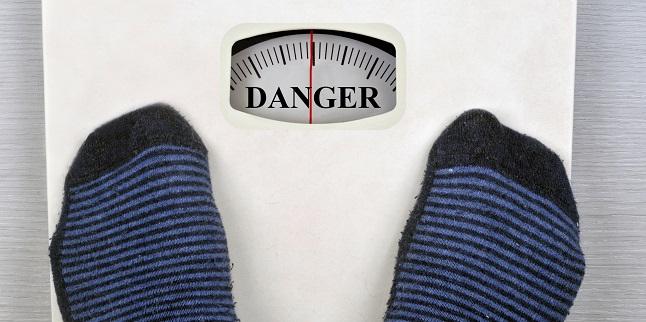Obesity and COVID-19: Theories and Blame Fill the Scientific Void
Obesity is the latest theory du jour for why some SARS-CoV-2 infections take a deadlier course, particularly in the young.

Around the globe, more and more people are asking: what is the link between obesity and disease severity and death with COVID-19? Whether high body mass index (BMI) plays a causative role in weakening the lungs and the body’s ability to fight the virus, is merely a marker of less-optimal health, or is simply so ubiquitous around the world—the case of one pandemic meeting another—are all questions fueling an increasingly vociferous debate.
No stranger to controversy, Aseem Malhotra, MD, a consultant cardiologist at Lister Hospital (Stevenage, England) and the co-author of a best-selling high-fat/low-carb diet book, took to BBC Radio 5 live earlier this week to detail his concerns. Asked by host Stephen Nolan how much of a risk is conferred by obesity, Malhotra called it a “huge risk” for COVID-19 and urged the National Health Service (NHS) to do more to promote healthy eating in the midst of the pandemic. “And in fact if they don’t do this,” Malhotra told Nolan, “I actually consider it an act of negligence and ignorance.”
Malhotra, who took a similar stance in a viewpoint published in European Scientist last week, draws a line between the consumption of ultraprocessed foods, the 60% rate of overweight and obesity in the United Kingdom and the United States, and the severity of illness many in these two countries are facing from COVID-19, calling obesity—and metabolic syndrome more generally—the “elephant in the room” amid the scramble to prevent more deaths.
“I think that message needs to be loud and clear, and I call for this in my article, that actually to reduce morbidity and mortality from COVID-19 people need to be getting the message right now to be cutting out the ultraprocessed junk food,” Malhotra told TCTMD. “Eat real food, protect the NHS, and save lives.”
Science Deficits and the Blame Game
Preexisting cardiovascular disease, diabetes, and hypertension were identified early on as predisposing factors for disease severity and death with COVID-19, but these are also common among the elderly, already at the highest risk for COVID-19. Now some experts believe obesity may explain why “otherwise healthy” young people are needing hospitalization and are dying. And while many scientists and physicians dismiss Malhotra as attention-seeking—he earned a reputation as a cholesterol sceptic, famously taking on statin studies for downplaying side effects—he’s not the only one speaking out about excess body weight and COVID-19 severity.
I think that message needs to be loud and clear . . . that actually to reduce morbidity and mortality from COVID-19 people need to be getting the message right now to be cutting out the ultraprocessed junk food. Aseem Malhotra
Jean-François Delfraissy, MD, PhD, who heads France’s COVID-19 scientific council, has been widely quoted warning that obese young people “need to be careful” about COVID-19 infection: “That is why we’re worried about our friends in America, where the problem of obesity is well known and where they will probably have the most problems because of obesity.”
Other mainstream media have picked up the debate. “Obesity Linked to Severe Coronavirus Disease, Especially for Younger Patients,” read a New York Times headline last week. In Wired, by contrast, a column in response to Delfraissy’s comments entitled “COVID-19 Does Not Discriminate by Body Weight” warned that the link between obesity and COVID-19 mortality has been “grossly overstated.”
Ethan Weiss, MD (University of California, San Francisco), pointed out that everyone these days has a pet theory. This is particularly true, he said, for researchers whose own studies have been put on ice for the duration of the pandemic, leading to a lot of armchair theorizing.

“We're in this unbelievable phase of data coming at a pace we've never seen before, but also at a quality that is basically as low par as you can get,” Weiss told TCTMD. “It's all observations, anecdotes, case series. We have so little well-controlled [science], and the human mind is so powerful. . . . I think that's probably led to some herd mentality and hysteria.” That said, he continued, “there are a few things I think that have been hard to dismiss as being just pure anecdote, and I think one of them is probably this relationship between cardiometabolic risk factors and morbidity, mortality” from COVID-19.
Benoit Arsenault, PhD (Université Laval, Quebec City, Canada), told TCTMD that he, too, has been pondering the potential link between obesity and COVID-19. “I think that for obesity we can say, for the moment, that at least there is signal,” he said, “but the science is preliminary, the numbers are small, and there's probably also a little bit of selection bias going on in those studies.”
Many Theories, Limited Science
In China, Cai Qingxian, MD (Southern University of Science and Technology, Shenzhen, China), and colleagues, writing in a Lancet preprint published online April 1, 2020, report that obesity (defined as a BMI > 28 kg/m2) was associated with a 2.42-fold higher risk of developing severe pneumonia among the 383 COVID-19 patients admitted to the Hospital of Shenzhen between January 11 and February 16. The finding held up even after adjusting for baseline cardiovascular risk factors including hypertension and diabetes.
In France, Arthur Simonnet, MD (Centre Hospitalier Universitaire de Lille), and colleagues also performed a retrospective review of the 124 consecutive patients hospitalized at their single center. In an early-online publication of Obesity, they report that the proportion of patients requiring mechanical ventilation was highest in patients with severe obesity (BMI > 35)—a sevenfold higher risk in this group than in patients with a BMI less than 25. Moreover, need for mechanical ventilation was significantly linked with both male sex and BMI, independent of age, diabetes, and hypertension.
US numbers reported late last week—and the impetus for the New York Times article—provide a similar picture. Christopher M. Petrilli, MD (NYU Langone Health, New York, NY), and colleagues, whose paper has been posted to the MedRxiv preprint server, looked at COVID-19 hospitalizations and “critical illness,” defined as intensive care, mechanical ventilation, hospice and/or death, among 4,103 consecutive patients with a lab-confirmed diagnosis admitted to their hospital between March 1 and April 2, 2020. In multivariable logistic regression, the strongest risk factors for hospitalization were age > 65 and obesity. Key risk factors for critical illness were oxygen impairment at admission and markers of inflammation.
We're in this unbelievable phase of data coming at a pace we've never seen before, but also at a quality that is basically as low par as you can get. Ethan Weiss
Speaking with TCTMD, Petrilli pointed out that obesity likely underpins both endpoints since it is a pro-inflammatory state. “We can extrapolate, given that we now we have this data, that [obese] patients are at higher risk of progressing to more severe disease, and we do think that it's largely driven by an overreaction of the immune system to create this hyperinflammatory slide,” he commented.
Malhotra, as well as Arsenault, both highlighted the still-murky connection between obesity, other cardiometabolic diseases, and the underlying inflammatory substrate.
The signal linking COVID-19 disease course and obesity “may be purely anatomical,” Arsenault said, “because people who have a very elevated BMI might also have impaired respiratory function. But on the other hand, the reason could be more physiological, because there have been many studies showing that regardless of the body mass index, people who have an elevated waistline, for instance, have a higher risk of developing insulin resistance or type 2 diabetes, elevated blood pressure, and so on. I think it is also very interesting and especially in relation with COVID-19, that people who have elevated waistlines probably have elevated inflammatory markers as well.”
This is something Arsenault and his colleagues have been investigating for years; COVID-19 offers a new perspective worthy of further research, he said. “For instance, the so-called inflammatory storm may be the result of an overactive immune system, and these people who have elevated waistlines might have elevated levels of inflammatory markers like CRP, IL-6 or IL-1.”
On the other hand, said Arsenault, there’s also the fast-evolving hypotheses linking coagulation markers and COVID-19 severity, a point raised by Weiss and Petrilli and colleagues as well.
And as much as the obesity hypothesis dovetails nicely with the emerging inflammatory hypothesis of COVID-19 pathology it also, as several experts noted to TCTMD, ties in with evidence pointing to higher morbidity and mortality among racial and socioeconomic minority groups where food insecurity, as well as obesity and metabolic syndrome, are also rampant. Teasing out the impact of health disparities on infection severity, not to mention genetic underpinnings for both obesity and COVID-19 morbidity and mortality is, at this point, impossible.
Actionable Evidence?
For now, Malhotra believes that government policy changes focused on improving the public’s diet, “may not just save hundreds and potentially thousands of lives around the world in the coming months,” he told the BBC, but also prevent future pandemics from swamping health systems already overwhelmed by patients with chronic diseases linked to poor diet.
He was even more forceful in his comments to TCTMD. “I think we're going to be locked down for a few more weeks, and I think if people do change their diet tomorrow, my view is that not only will it have an impact on their health, but it will significantly reduce the risk of complications of COVID-19 within a short space of time.”
Weiss acknowledged his own biases—he started a company and a smartphone app based on the strict no-carb “keto” diet—but stressed the need for clinical trial evidence supporting any link between diet and outcomes, COVID-19-related or otherwise. A surprising number of physicians like Malhotra, he noted, have taken to social media to expound the benefits of low-carb diets to prevent COVID-19 infection, something Weiss characterized as dangerous and unscientific.
I think people need care and compassion, and the last thing that they need is for others, whether it is their friend or a relative or the media, to be blaming them and making them feel guilty for catching the virus, because it's not true and it's not their fault. Benoit Arsenault
“Telling people to get healthy and lose weight and stay active and exercise during this time when obviously a lot of people are sitting around not doing anything, eating junk food, not exercising, stress-eating, etc, etc—sure, that's a reasonable thing from the standpoint of common sense,” said Weiss. “But to give somebody the idea that there are data to support that by doing so they're going to reduce the risk of infection or reduce their risk of dying from infection, to me, that's just irresponsible nonsense. That's not helpful.”
Petrilli, likewise, steered clear of suggesting that their paper advocates for people to lose weight to protect themselves from COVID-19. Rather, he said, “this is more of a reminder for the providers taking care of patients to just keep it in the back of their mind that obesity is a risk factor for progression,” he said. “If you have someone who is either morbidly obese or obese with other cardiovascular complications, you should take a pause, potentially, before discharging them and consider observing them more closely.”
Arsenault sees this from a different angle, pointing out that “fat-shaming” people in the midst of a pandemic, especially when so many people are out of work with tighter food budgets, with access to healthier foods more prohibitive than usual, is not the right approach.
“I think we need to be very careful when we communicate the message to the population, because people who are infected by the new coronavirus, they already have to deal with anxiety, and being infected with a potentially deadly virus, it can make them feel very anxious,” Arsenault said. “I think people need care and compassion, and the last thing that they need is for others, whether it is their friend or a relative or the media, to be blaming them and making them feel guilty for catching the virus, because it's not true and it's not their fault.”
As for the possibility that the US and the UK might be harder hit than Italy or China or France because of higher population obesity levels, Arsenault urged restraint. “I wouldn't go that that far,” he said, “because what we want to do now is to do strong epidemiological studies, with good methods. And comparing one country to another is basically doing an ecological study and we can't get causality out of that, only shoddy observations.”
Even if scientists eventually get good observational data showing that obesity is a risk factor for COVID-19 and its complications, “we have to be very cautious there as well,” Arsenault said. “What this crisis has brought to light are the very disturbing health disparities that keep on growing year after years in many countries and especially in the US. And I think this pandemic will only make these health disparities progress faster.”
Shelley Wood is the Editor-in-Chief of TCTMD and the Editorial Director at CRF. She did her undergraduate degree at McGill…
Read Full Bio

Comments